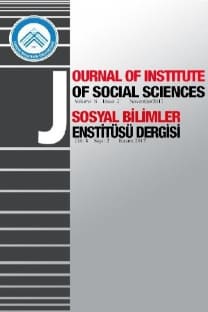Yükseköğretimdeki Hemşirelik Öğrencilerinin Öğrenme Yaklaşımları ve Çalışma Becerilerinin Akademik Başarı Algıları ve Bazı Sosyo-demografik Değişkenlerle İlişkisi
Relationship between Approaches to Learning and Study Skills and Some Demographic Characteristics of Undergraduate Nursing Students’ and Perceived Academic Achievement in Higher Education
___
- Başak, T., Uzun, Ş., Arslan F. (2008). Hemşirelik Yüksek Okulu Öğrencilerinin Zaman Yönetimi Becerileri. Taf Prev Med Bull, 7(5): 429-434.
- Bay, E., Tuğluk, N., Gençdoğan, B. (2004). Üniversite Öğrencilerinin Ders Çalışma Becerilerinin İncelenmesi. Türk Eğitim Dergisi, 2(2): 223-234.
- Birol, L. (2010). Hemşirelik Süreci. İzmir, Etki Matbaacılık.
- Bradshaw, M.J. (2001). Fuszard’s Innovative Teaching Strategies in Nursing. In: Effective Learning: What Teachers Need to Know. USA, Aspen Publishers.
- Byrne, M., Flood, B., Willis. P. (2009). An Inter‐institutional Exploration of the Learning Approaches of Students Studying Accounting. International Journal of Teaching and Learning in Higher Education, 20(2): 155-167.
- Cebeci, S., Dane, Ş., Kaya, M., Yigitoglu, R. (2013). Medical Students’ Approaches to Learning and Study Skills. Procedia-Social and Behavioral Sciences, 93: 732-736.
- Deryakulu, D. (2004). Üniversite Öğrencilerinin Öğrenme ve Ders Çalışma Stratejileri ile Epistemolojik İnançları Arasındaki İlişki. Kuram ve Uygulamada Eğitim Yönetimi, 38(55): 230-249.
- Ekinci (2009). Learning Approaches of University Students, Education and Science, 34(151).
- Erdamar (Koç) G. (2010). Öğretmen Adaylarının Ders Çalışma Stratejilerini Etkileyen Bazı Değişkenler. Hacettepe Üniversitesi Eğitim Fakültesi Dergisi, 38: 82-93.
- Gürlen E., Turan, S., Senemoğlu, N. (2013). The Relationship Between Learning Approaches of Prospective Teachers and Their Academic Achievement. Educational Research and Review, 8(5): 171-178.
- İlhan, M., Çetin, B., Öner M., Yılmaz, F. (2013). Ders Çalışma Becerileri ile Akademik Risk Alma Arasındaki İlişkinin Kanonik Korelasyon ile İncelenmesi, Eğitim Bilimleri Araştırmaları Dergisi, 3(2): 123-146.
- International Council of Nurses (ICN) (2014). Nurses: A Force for Change: A Vital Resource for Health, http://www.icn.ch/.
- Ozan, C., Köse, E., Gündoğdu, K. (2012). Okul Öncesi ve Sınıf Öğretmenliği Öğrencilerinin Öğrenme Yaklaşımlarının İncelenmesi, Eğitim Bilimleri Araştırmaları Dergisi, 2(2): 75–92.
- Senemoglu, N. (2010). Gelisim, Öğrenme ve Öğretim: Kuramdan Uygulamaya, 17. Baskı. Ankara: A Pegem Akademi.
- Senemoğlu, N. (2011). College of Education Students’ Approaches to Learning and Study Skills, Education and Science, 36(160): 65-80. Tait, H., Entwistle, N.J., McCune, V. (1998). ASSIST: A Reconceptualisation of the Approaches to Studying Inventory. In C. Rust (Ed.) Improving Students as Learners. Oxford: Oxford Brookes University, the Oxford Centre for Staff and Learning Development.
- Turan, S., Demirel Ö. (2010). Öz-düzenleyici Öğrenme Becerilerinin Akademik Başarı ile İlişkisi: Hacettepe Üniversitesi Tıp Fakültesi Örneği. Hacettepe Üniversitesi Eğitim Fakültesi Dergisi, 38: 279-291.
- Tümkaya, S., Bal, L. (2006). Çukurova Üniversitesi Öğrencilerinin Ders Çalışma Alışkanlıklarının Bazı Değişkenler Açısından İncelenmesi. Çukurova Üniversitesi Sosyal Bilimler Enstitüsü Dergisi, 15(2): 313- 326.
- ISSN: 1309-3738
- Yayın Aralığı: Yılda 2 Sayı
- Başlangıç: 2010
- Yayıncı: Prof. Dr. Coşkun POLAT
Anlaşmazlığı Hoşgörme Ölçeğinin (AHÖ) Türkçeye Uyarlanması
Duygusal ve Rasyonel Sosyal Reklam Mesajlarının Etkililiği Üzerine Bir Araştırma
Doğal ve Kültürel Mirasın Hayati Sorunu: İstisnai Evrensel Değer (UNESCO Dünya Mirası Listesi)
İlköğretim Okullarındaki Özengen Müzik Eğitiminin Öğrencilerin Müziksel Davranışlarına Yansıması
Elvan KARAKOÇ, Yılmaz ŞENDURUR
Dîvâne Mehmed Çelebi’nin Müseddesi ve Müseddese Yapılan Tazminler Üzerine
Siyaset Kültürümüzde Ahde Vefâ ve Nakz-i Ahd
Şaman Davulu Dinlemenin Ruhsal Duruma Etkisi
Ali Maruf ALASKAN, Ayşegül BİLGE, Çağnur ŞARMAN
Serap ÇABUK, Hatice DOĞAN SÜDAŞ, Deniz ZEREN
Mali Teşvik Uygulamalarında Ar-Ge ve Önemi
Türkiyedeki Vakıf Üniversitelerinin Eğitim Faaliyetlerinin Mevcut Durumunun Araştırılması
